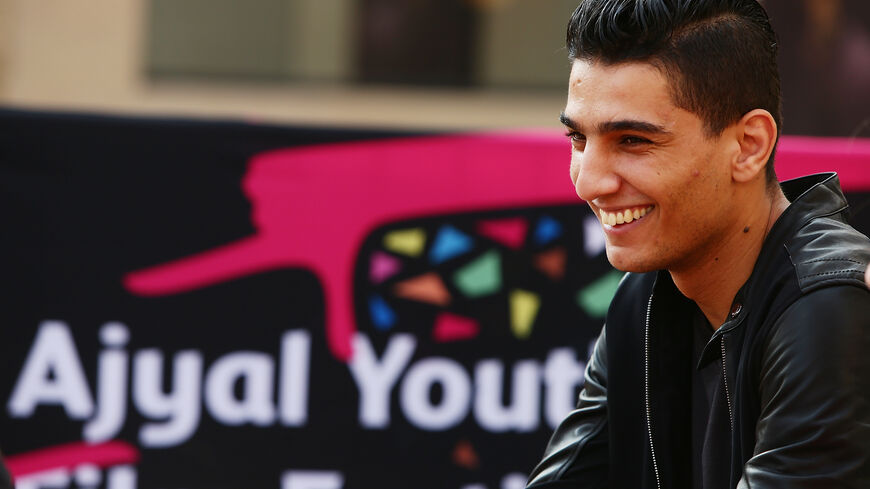Famed Palestinian singer Mohammed Assaf said his song "My Blood Is Palestinian" was removed from digital audio platforms Spotify and Apple Music on Sunday due to alleged anti-Israel content.
Spotify released a statement saying it wasn't them who decided to remove the Gazan artist’s song. Still, social media users are calling the act discriminatory and a product of the ongoing censorship of Palestinian content masked under the guise of eliminating anti-Israeli sentiment.
What happened: Gazan singer Mohammed Assaf said on Sunday he received an email from Spotify stating that his song was removed from the digital music and podcast platform for “inciting against Israel,” he told London-based news site Al Araby Al Jadeed (The New Arab) in an interview.
"I checked my official page on the Spotify and Apple Music platforms and was surprised that the song 'Ana Dammi Falastini' ("My Blood Is Palestinian") was deleted," he said.
Al Araby Al Jadeed reported that Spotify denied it was its decision to remove the song from its platform and said that song availability may vary from country to country.
"The removal of some of Mohammed Assaf’s content was not determined by Spotify but rather by the distributor. We anticipate its return in the near future and apologize for any inconvenience caused,” Spotify said in a statement, according to the outlet — which identified Saudi-media giant MBC as the owner of Assaf’s label, Platinum Records.
In response to the claims, Spotify Arabia tweeted on May 21 its support for Assaf. “We have always and still support the work and art of the artist, beloved of Arabs, Mohammed Assaf. We look forward to getting his lost content back on our platform soon."
لقد كنا وما زلنا ندعم أعمال وفن الفنان محبوب العرب محمد عساف. ونتطلع إلى أن نستعيد محتواه المفقود على منصتنا قريبًا. لنستمتع ببعض من أفضل أعماله معًا على قائمة This is Mohammad Assaf.https://t.co/pAJRuuVB2H @MohammedAssaf89 pic.twitter.com/xSo7FVqvNi
— Spotify العالم العربي (@SpotifyArabia) May 21, 2023
Why it matters: The removal of Assaf’s nationalistic song is seen by human rights activists and many of his fans as the most recent example of ongoing censorship of Palestinian content by international and predominantly Western media organizations.
A number of social media users shared the lyrics online to show that Assaf’s song about Palestinian nationalism did not mention Israel or violence.
Muhammad Shehada, chief of communications at Geneva-based NGO Euro-Med Monitor, tweeted, “The lyrics are only about being Palestinian and proud.” He added, “Our basic existence is banned."
A number of Twitter users said that Spotify had received requests to remove the patriotic song. Doha News, a Qatari news blog, reported that the removal decision was motivated by a petition organized by We Believe in Israel (WBII, a British pro-Israel advocacy group) and the Board of Deputies of British Jews in March of 2022. Together the organizations gathered almost 4,000 signatures.
‘Ana Dammi Falastini’ is removed by racist Spotify at the behest of the israeli regime under the degenerately-false accusation of "incitement” https://t.co/U92cYtlu7q
— Sarah Wilkinson (@swilkinsonbc) May 21, 2023
لقد كنا وما زلنا ندعم أعمال وفن الفنان محبوب العرب محمد عساف. ونتطلع إلى أن نستعيد محتواه المفقود على منصتنا قريبًا. لنستمتع ببعض من أفضل أعماله معًا على قائمة This is Mohammad Assaf.https://t.co/pAJRuuVB2H @MohammedAssaf89 pic.twitter.com/xSo7FVqvNi
— Spotify العالم العربي (@SpotifyArabia) May 21, 2023
Many users believe that deleting Assaf's song is just the most recent example of a bigger campaign to erase the views and identity of Palestinians online.
In May 2021, Instagram removed posts and blocked hashtags about Al-Aqsa in Jerusalem linked to content showing Israeli forces storming the shared Islamic and Jewish site during the Muslim holy month of Ramadan. The perceived shadow ban also hid searches and blocked content around activities in the occupied territory of Sheikh Jarrah in East Jerusalem, where Palestinians faced forced expulsions by Israeli authorities at the time.
Human rights groups and Palestinian activists called out the move as a discriminatory act against Palestinians' free speech given that the social media platform identified content creators of Palestinian topics and their content as violent or dangerous organizations in warning advisory messages.
Instagram, owned by Facebook at the time, later issued an apology and reported the mistake as a moderation glitch that affected particular groups of people.
"We are so sorry this happened. Especially to those in Colombia, East Jerusalem and Indigenous communities who felt this was an intentional suppression of their voices and their stories — that was not our intent whatsoever," Instagram said at the time.
Reporting from the UK-based, independent nonprofit Business and Human Rights Resource Center indicated that the algorithm changes could have been deliberate, as Facebook and Instagram were accused of being biased against Palestinians around the same time that Facebook created a special operations center for content on the Israeli-Palestinian conflict in May 2021.
The issue led Facebook employees to speak up internally about the matter via an upvote or downvote on a statement in an internal company questionnaire.
“Our integrity systems are failing marginalized groups (see: Palestine, Black Lives Matter (BLM), Indigenous women),” reported the Business and Human Rights Resource Center.
Background: Assaf rose to fame in 2013 after the wedding singer from humble beginnings at the Khan Younis refugee camp in Gaza became the first Palestinian to win the popular regional singing competition show, "Arab Idol," the Middle East adaption of the United States' "American Idol."
The now 33-year-old singer lives in Dubai and signed with MBC-owned Platinum Records. He continues to be known for his songs that promote a strong Palestinian identity. Assaf is also a Goodwill Ambassador with the United Nations Relief and Works Agency (UNRWA) for Palestine Refugees in the Near East.


f0eb.jpg)





